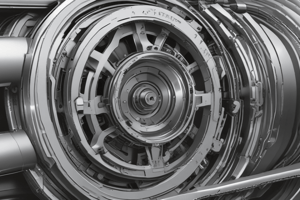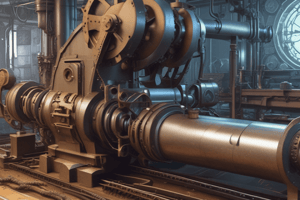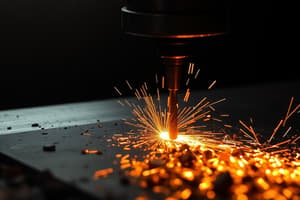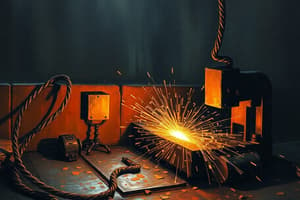Podcast
Questions and Answers
Which of the following is NOT a basic chip formation process?
Which of the following is NOT a basic chip formation process?
- Welding (correct)
- Turning
- Milling
- Grinding
What are the key cutting parameters in metal cutting processes?
What are the key cutting parameters in metal cutting processes?
- Weight and volume
- Material and color
- Speed, feed, and depth of cut (correct)
- Temperature and humidity
Which machining process is primarily used to remove material by pressing a rotating abrasive wheel against it?
Which machining process is primarily used to remove material by pressing a rotating abrasive wheel against it?
- Grinding (correct)
- Sawing
- Turning
- Drilling
Which input factors are considered when selecting a machine tool for machining processes?
Which input factors are considered when selecting a machine tool for machining processes?
Which of the following describes the term 'chip formation' in machining?
Which of the following describes the term 'chip formation' in machining?
What is the importance of the cutting tool geometry in machining?
What is the importance of the cutting tool geometry in machining?
Which process in machining is primarily associated with creating holes in a workpiece?
Which process in machining is primarily associated with creating holes in a workpiece?
Which machining process is involved with producing flat or contoured surfaces by moving a cutting tool relative to the workpiece?
Which machining process is involved with producing flat or contoured surfaces by moving a cutting tool relative to the workpiece?
What does ϕ define in the context of machining?
What does ϕ define in the context of machining?
What is the German term for 'turning' according to the translation provided?
What is the German term for 'turning' according to the translation provided?
Which of the following terms corresponds to 'cutting parameters' in German?
Which of the following terms corresponds to 'cutting parameters' in German?
What does ψ represent in the context of dislocation movement during machining?
What does ψ represent in the context of dislocation movement during machining?
What is the translation of 'speed' in machining processes to German?
What is the translation of 'speed' in machining processes to German?
What is the primary purpose of cutting speed (V) in machining?
What is the primary purpose of cutting speed (V) in machining?
Which unit is NOT commonly used to express feed in turning operations?
Which unit is NOT commonly used to express feed in turning operations?
How is the depth of cut (DOC) defined in turning processes?
How is the depth of cut (DOC) defined in turning processes?
What effect does the selection of cutting speed (V) have on the machining process?
What effect does the selection of cutting speed (V) have on the machining process?
What is the measurement used to indicate how much material the tool removes per pass in a machining operation?
What is the measurement used to indicate how much material the tool removes per pass in a machining operation?
In turning, what units are typically used for measuring the depth of cut (DOC)?
In turning, what units are typically used for measuring the depth of cut (DOC)?
Which statement about feed in machining is true?
Which statement about feed in machining is true?
What is a likely consequence of selecting an incorrect cutting speed (V)?
What is a likely consequence of selecting an incorrect cutting speed (V)?
What is the primary function of machining processes?
What is the primary function of machining processes?
Which term is commonly used to describe machining processes on metal?
Which term is commonly used to describe machining processes on metal?
In the context of machining, what does high precision work involve?
In the context of machining, what does high precision work involve?
Which of the following machines is NOT typically associated with machining processes?
Which of the following machines is NOT typically associated with machining processes?
What is one of the critical reasons for attending lectures on machining?
What is one of the critical reasons for attending lectures on machining?
What are the typical processes represented in machining families?
What are the typical processes represented in machining families?
What are lecture slides and notes essential for?
What are lecture slides and notes essential for?
Which of the following best describes the importance of machining in manufacturing?
Which of the following best describes the importance of machining in manufacturing?
What parameter is primarily influenced by the desired cutting velocity when operating a lathe?
What parameter is primarily influenced by the desired cutting velocity when operating a lathe?
When selecting the cutting tool, which factors are crucial for determining the cutting speed?
When selecting the cutting tool, which factors are crucial for determining the cutting speed?
For effective machining, which combination of parameters needs to be optimized?
For effective machining, which combination of parameters needs to be optimized?
What role do standard references play in the selection of cutting speed and feed rates?
What role do standard references play in the selection of cutting speed and feed rates?
Which component is considered the most critical in machining according to the content?
Which component is considered the most critical in machining according to the content?
How does the selection of cutting speed influence the spindle's performance?
How does the selection of cutting speed influence the spindle's performance?
In the context of machining, which of the following is NOT a parameter that depends on cutting speed?
In the context of machining, which of the following is NOT a parameter that depends on cutting speed?
What aspect must be considered when selecting values for speed and feed for turning processes?
What aspect must be considered when selecting values for speed and feed for turning processes?
Flashcards are hidden until you start studying
Study Notes
Attendance and Study
- Attending lectures is crucial
- Lecture slides and notes are essential for assessments
- Active participation in lectures is encouraged
- Taking notes during lectures and revising them is recommended for assessments
Introduction to Machining
- Machining removes unwanted material from workpieces in the form of chips
- It is often referred to as metal cutting or metal removal when dealing with metal workpieces
- The majority of manufactured products require machining at some stage of production
Machining Processes
- Machining processes cover a wide range, from rough work to high-precision work with tolerances as small as 0.0001 in.
- It is considered a fundamental manufacturing process
Types of Machining Processes
- Lathe machines
- Milling machines
- Drilling machines
- CNC milling machines
Fundamentals of Machining
- The process of metal cutting is complex due to the variety of input factors
- Input factors include: Machine tool selection, cutting tool selection, workpiece properties, cutting parameters, workpiece holding devices, and fixtures
- The process involves seven basic chip formation methods: turning, milling, drilling, sawing, broaching, shaping, planing, and grinding
Cutting Parameters
- Cutting speed (V): Velocity of the cutting tool relative to the workpiece, measured in units like surface feet per minute (sfpm), inches per minute (in./min), meters per minute (m/m), or meters per second (m/s)
- Feed (fr): Amount of material removed per revolution or per pass of the tool over the workpiece, measured in units like inches per revolution, inches per cycle, inches per minute, or inches per tooth
- Depth of cut (DOC): Distance the tool is plunged into the surface, calculated as half the difference between the initial diameter (D1) and final diameter (D2)
Cutting Speed and Spindle RPM
- Cutting speed affects the surface speed of the rotating part, related to the workpiece's outer diameter
- The operator sets the spindle's RPM (revolutions per minute) to achieve the desired cutting velocity
- The choice of cutting tool material and geometry affects the cutting speed selection
Selection of Cutting Parameters
- Cutting speed, feed rate, and depth of cut selection depend on various factors
- Experience and experimentation are needed to optimize these parameters
- Tables and references from manufacturers provide guidance for parameter selection
German Terminology
- The following English terms and their German equivalents are provided:
- Machining processes - Bearbeitungsprozesse
- Turning - Drehen
- Drilling - Bohren
- Milling - Fräsen
- Sawing - Sägen
- Cutting parameters - Schneidparameter
- Speed - Geschwindigkeit
- Depth of cut - Schnitttiefe
- Strain - Belastung
- Tensile strength - Zugfestigkeit
Studying That Suits You
Use AI to generate personalized quizzes and flashcards to suit your learning preferences.





